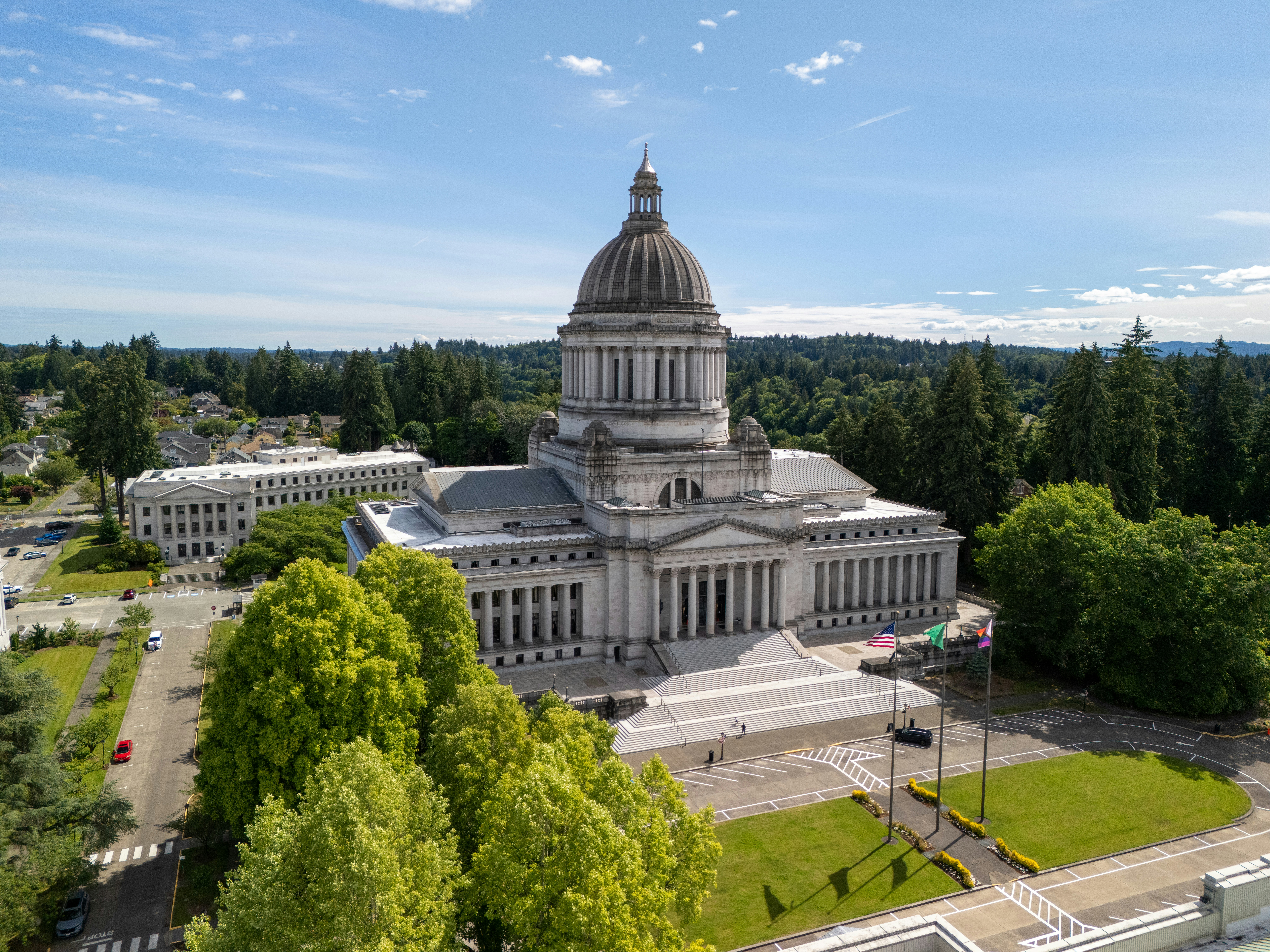Last week, the House Civil Rights and Tribal Relations Committee held a work session to review the state’s Keep Washington Working Act (KWW), the 2019 law that restricts cooperation between local agencies and federal immigration authorities.
This meeting was meant to “review” how the law is functioning, amid the Trump Administration’s immigration enforcement efforts. As expected, the meeting was a full defense of Washington’s sanctuary policies. Representatives from the Attorney General’s Office, OneAmerica, the ACLU, and others praised KWW as a model of “inclusion” and “protection.” They spoke at length about how immigrants make up roughly 16% of the state’s workforce and 15% of its business owners.
Outdated Data, Big Questions
Despite holding this meeting in 2025, six years after the law’s passage, the Attorney General’s Office provided no updated written data on how KWW has impacted Washington’s economy, law enforcement, or public safety. The only source we could find that seemed to align with their data was a 2019 OFM report, based on 2017 immigration data.
That means citizens have no way to know:
- How many undocumented immigrants currently live in Washington;
- What the fiscal impact on taxpayers looks like in 2025; or
- How local law enforcement has been affected by restrictions on cooperating with federal agencies.
Given national trends, including a significant rise in border crossings from 2021–2023, it’s almost certain those 2017 numbers no longer reflect today’s reality. In addition, the Washington state legislature has passed a number of policies to expand its sanctuary status.
What the Law Actually Does
The Keep Washington Working Act was signed in 2019 under Governor Jay Inslee and written to limit how state and local agencies share information with federal immigration authorities. It restricts data-sharing, detainer requests, and cooperation with ICE unless required by a court order.
Democrats, including Washington’s current Governor, Bob Ferguson, love to remind citizens that this was a “bipartisan” bill. When just one member of the other party crosses the line to vote for a bill, it technically makes the bill “bipartisan.” In the case of KWW, 3 Republicans in the House voted to pass this bill: former House Minority Leader JT Wilcox, current House Minority Leader Drew Stokesbary and Representative Alex Ybarra. Washington’s law puts the state on a collision course with federal policy, especially as the Trump administration reasserts immigration enforcement nationwide. In fact, U.S. Attorney General Pam Bondi recently sent a letter to Washington officials warning that sanctuary policies could put billions in federal funding at risk.
KWW defenders love the line: “Immigrants keep Washington working!” The Attorney General’s Office representative claims they drive the economy east and west, from agriculture to hospitality. But let’s check the receipts: their own 2019 Office of Financial Management (OFM) report, “Immigrants in Washington” (Brief #90). It shows 1 million immigrants (14% of population), including 264,000 undocumented, a 6.9% jump since 2010. Poverty figures showed 40% below 200% of the poverty line, double the 22% for U.S.-born citizens. And low-income rates for non-citizens was 34-40%, vs. under 20% for citizens.

Fast-forward to 2025: Undocumented immigrants paid about $3 billion in WA taxes in 2023 but that’s nothing in comparison to the amount in services going to immigrants. FAIR’s 2023 report pegs the national net cost of illegal immigration at $150.7 billion annually—after subtracting $32 billion in taxes. Washington’s share could easily be $3-5 billion, factoring in education, healthcare, and welfare (CBO estimates $16.2 billion nationally for Medicaid emergency care alone). Per capita that’s $8,776 per illegal immigrant, more than food stamps or Medicaid per recipient. KWW supercharges this by limiting data sharing, meaning more unvetted folks straining schools and hospitals.
How KWW Violates Federal Supremacy
KWW isn’t just bad policy, it’s arguably illegal. Codified in RCW 10.93 (law enforcement limits), 43.10 (AG policies), and 43.17 (agency data rules), it prohibits state resources for federal civil enforcement and mandates “minimal” data collection. Sounds like anti-commandeering (10th Amendment), but it crosses into active obstruction. 8 U.S.C. § 1373 bans restricting immigration status info-sharing, KWW’s “minimal data” rule is a direct hit.
atg.wa.gov The Illegal Immigration Reform and Immigrant Responsibility Act (IIRIRA, 1996) mandates cooperation or funding cuts—echoed in Trump’s January 20, 2025, EO “Protecting the American People Against Invasion.”
Trump’s April 2025 EO ramps it up, treating sanctuary defiance as potential RICO violations (18 U.S.C. § 1961) and obstruction (18 U.S.C. § 1501). Washington democrats have responded to Trump’s order, suing over DHS grants and claiming victories, but the US AG vows more action.
Community Harm & Advocacy Overreach
During the committee meeting, much of the discussion centered on the “trauma” associated with deportations and immigration enforcement. But what was missing from the conversation were the broader community impacts of Washington’s sanctuary policies , particularly how limited cooperation with federal authorities affects public safety.
According to ICE data, before President Trump took office, there were roughly 435,000 criminal non-citizens at large in the United States. That number has since declined due to stepped-up federal enforcement, which has prioritized individuals with serious criminal histories.
Meanwhile, some local jurisdictions that limit ICE cooperation have reported increases in certain crimes, including assaults and DUIs involving non-citizens. Seattle has seen similar challenges tied to repeat offenders who were previously released under sanctuary policies.
The Courts Open to All Act (COTA), passed in 2020, further limits federal immigration enforcement by prohibiting civil immigration arrests in or near courthouses. While supporters say it encourages victims and witnesses to come forward, critics argue it has resulted in more releases of individuals wanted by federal authorities.
The key takeaway: these policies have complex ripple effects. Yet state officials continue to frame the issue solely in terms of immigrant hardship, without addressing how sanctuary laws may also impact crime rates, court operations, and community safety as a whole.
The Bottom Line
During the meeting, representatives from the ACLU, OneAmerica, and the Northwest Immigrant Rights Project suggested amending the Keep Washington Working Act to add even stronger protections, potentially allowing individuals to sue local law enforcement or state agencies for perceived violations, such as cooperating with ICE. They referenced a 2024 University of Washington report calling for more “consistent application” of the law across all agencies.
There is no formal amendment proposed at this time, but this is something we will be watching for when the 2026 legislative session begins. Citizens should be watching closely, especially those concerned about how these proposals could impact local law enforcement, taxpayer costs, and public safety.
Whether you support or oppose Washington’s sanctuary stance, it’s fair to ask:
- Why hasn’t the Attorney General’s Office released updated figures?
- What are the real costs and consequences of the Keep Washington Working Act today?
- And when will Washingtonians get transparency on how their laws are affecting their communities and their wallets?
As citizens, staying informed is the first step toward accountability. We’ll keep following this story and tracking how Washington’s sanctuary policies evolve under renewed federal enforcement.
We’re fighting for you! Our work is 100% funded by citizens like you! and we cannot do this important work without your support. Please consider becoming making a donation today! Thank you for your support!



